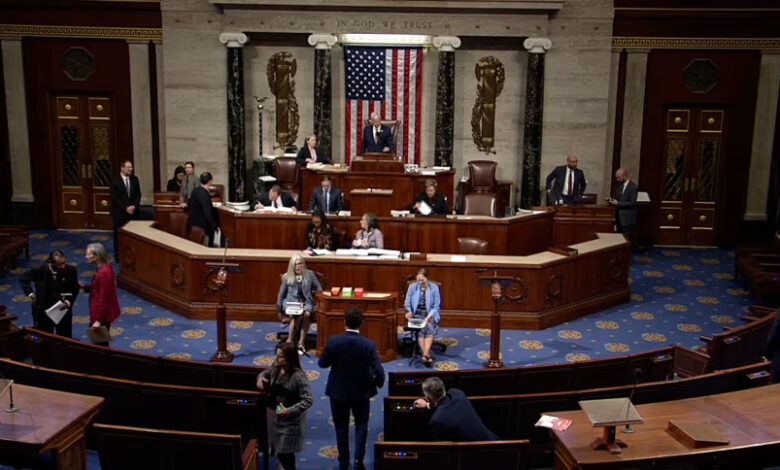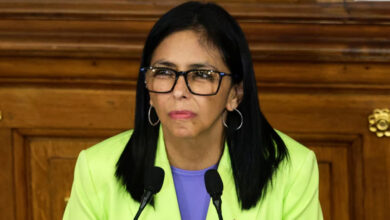
President Donald Trump late Wednesday signed a funding package to reopen the federal government, officially bringing a close to the longest shutdown in history.
The final approval came hours after the House voted 222 to 209 to pass a deal struck between Republicans and centrist Senate Democrats that keeps the government running through January and ensures some key agencies will be funded for the remainder of fiscal year 2026.
The agreement, which ended a record 43-day stalemate in Congress, will also reverse the mass federal layoffs carried out by Trump during the shutdown. It paves the way for paychecks to flow to government employees, as well as the resumption of critical food and nutrition services relied on by tens of millions of Americans.
Trump on Wednesday night cast the legislation as a victory over Democrats, calling it “a clear message that we will never give in to extortion, because that’s what it was, they tried to extort.”
“They didn’t want to do it the easy way,” he said from the Oval Office, attacking what he called “the extremists” in the Democratic Party. “They had to do it the hard way, and they look very bad.”
The White House signing ceremony was attended by a range of Republican lawmakers and capped a four-day sprint to pass the funding bill, after eight Senate Democrats broke ranks to compromise with Republicans amid worries about the shutdown’s widening economic consequences.
The deal guarantees an early December vote in the Senate on the expiring Obamacare subsidies that Democrats made the focus of their demands during the shutdown fight. But a vote to extend the subsidies is unlikely to succeed, a likelihood that’s driven intense blowback across the Democratic Party.
Most congressional Democrats loudly protested the bill in the run-up to Wednesday’s vote over concerns Americans’ health care premiums will skyrocket without the subsidies, with only six House Democrats voting in favor of the package.
“This fight is not over. We’re just getting started,” top House Democrat Hakeem Jeffries said ahead of the vote. “Tens of millions of Americans are at risk of being unable to afford to go see a doctor when they need it.”
Back in Washington for the first time since mid-September, Speaker Mike Johnson corralled almost all Republicans behind the bill, despite sharp complaints from some of his members over a contentious provision added by Senate Republicans that allowed senators to retroactively sue the Department of Justice for obtaining phone records during a Biden-era probe – potentially amounting to a major financial windfall for those lawmakers.
Johnson himself said he was blindsided by the language, and he said he didn’t know about it until the Senate had already passed the package.
“I was shocked by it, I was angry about it,” the speaker said, though he added that he did not believe Senate Majority Leader John Thune added it in a nefarious manner. “I think it was a really bad look, and we’re going to fix it in the House.”
To win over conservative holdouts, Johnson vowed that the House would take a future vote to strip that language — though it’s unclear if the Senate would take it up. Republicans like Rep. Chip Roy of Texas ultimately agreed not to amend the language in the current stopgap bill, since it would require the Senate to return to Washington to vote again and delay the end of the shutdown.
Conservatives like Roy had blasted that provision as “self-dealing,” since it would award senators $500,000 or more in damages for each violation by the government if their lawsuit is successful. The amendment appeared to benefit eight senators in particular who had been subpoenaed by the previous administration into investigations into Trump’s first term.
Rep. Rosa DeLauro, the top Democrat on the House Appropriations panel, accused those eight senators of voting “to shove taxpayer dollars into their own pockets – $500,000 for each time their records were inspected.”
The House Democrats who voted in favor of the compromise bill to reopen the government were: Reps. Jared Golden, Adam Gray, Marie Gluesenkamp Perez, Henry Cuellar, Tom Suozzi and Don Davis. GOP Reps. Thomas Massie voted and Greg Steube against the bill.
The end of the government shutdown will usher in a frenetic few weeks of work for the House, which has been largely shuttered since late September. As part of the GOP’s pressure campaign on Democrats, Johnson had decided to keep all members out of Washington until Senate Democrats agreed to back the GOP’s existing funding plan.
Now, Republicans and Democrats have just four weeks in session before the end of the year — when those Obamacare tax credits expire. Trump has called for revamping the law rather than extending the existing subsidies, setting up a high-stakes showdown over health care that could carry political ramifications for next year’s midterm elections.
“Obamacare was a disaster,” Trump said Wednesday night. “We’ll work on something having to do with health care. We can do a lot better.”
But there are plenty of other deadlines, including Congress’ farm bill and a slew of expiring energy credits.
House Republicans are also eager to pass as many spending bills as possible to improve their negotiating stance with the Senate ahead of that next deadline on January 30.
Johnson also faces another hot-button issue: the question of how Congress should handle the Jeffrey Epstein files.
Not long before the votes to reopen the government got underway, a newly elected Democrat — Rep. Adelita Grijalva — became the critical 218th signature to force a vote to compel the Justice Department to release all of its case files related to Epstein.
Johnson announced to reporters soon after Grijalva signed the petition that he will put a bill compelling the Department of Justice to release all of its Epstein case files on the House floor next week – earlier than expected, and after an extraordinary White House pressure campaign earlier Wednesday failed to convince any Republicans to remove their name from the petition.
The effort coincided with intensifying scrutiny over the Epstein files in the House. Earlier Wednesday, House Democrats on the Oversight panel released new emails that showed Epstein had repeatedly mentioned Trump by name in private correspondence, and then the GOP-led committee released 200,000 pages of documents the panel received from Epstein’s estate.
This headline and story have been updated with additional details.




